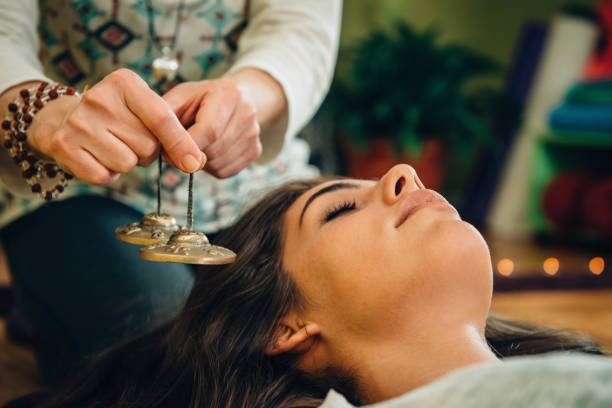Natural Remedies for Managing Anxiety and Stress
Anxiety and stress are part of life, but that doesn’t mean they have to overwhelm us. Many natural remedies can reduce the effects of stress, providing calming and stabilizing benefits without the side effects associated with medications. From tried-and-tested herbal remedies to lifestyle changes, here are the top 10 natural ways to manage anxiety and bring peace to your daily life.
1. Herbal Remedies for Anxiety Relief
Herbal remedies have been used for centuries to reduce anxiety and balance emotions. Certain plants contain compounds that work with your body to promote calmness, reduce stress and even improve sleep quality, which can directly impact anxiety levels.

- Ashwagandha: Known as an adaptogen, ashwagandha helps the body adapt to stress by balancing cortisol levels. Research suggests that it can significantly reduce symptoms of anxiety, making it an effective supplement for daily use. Take ashwagandha in capsule form or try mixing a small amount of its powder into warm milk or a smoothie.
- Chamomile: Chamomile’s gentle, sedative-like properties make it a popular choice for reducing mild anxiety and promoting sleep. Drinking chamomile tea an hour before bedtime can calm the mind and prepare the body for restful sleep. For those who don’t drink tea, chamomile supplements are also available.
- Passionflower: This herb increases levels of gamma-aminobutyric acid (GABA) in the brain, which reduces brain activity and brings a sense of calmness. Passionflower may be especially helpful for those experiencing acute anxiety. You can find it as a tea, capsule, or tincture that can be added to water.
Dosage Tips: While herbal remedies are generally safe, always consult a healthcare provider before starting any new supplements, especially if you are taking other medications or have any underlying health issues.
2. Essential Oils for Aromatherapy
Aromatherapy, or the therapeutic use of essential oils, has been shown to relieve anxiety by stimulating the limbic system, the part of the brain associated with emotions and memories. Certain essential oils are particularly effective at reducing stress and promoting calmness.

- Lavender Oil: Lavender is widely recognized for its relaxing and calming effects. Studies show that lavender oil can reduce anxiety levels when inhaled, diffused, or applied topically. To use, simply add a few drops to a diffuser, or dilute with a carrier oil and apply to your wrists or neck.
- Bergamot Oil: With its refreshing and citrusy aroma, bergamot oil can lift mood and soothe stress. It is known to reduce anxiety and improve overall mood. Bergamot oil can be added to bath water or used in a diffuser for relaxation.
- Ylang Ylang Oil: Known for its ability to lower blood pressure and heart rate, ylang ylang oil promotes relaxation. Smelling it can induce a sense of peace and stability, making it ideal for moments of high stress or anxiety.
Using Essential Oils: When using essential oils, be mindful of potential skin sensitivities. Always dilute the essential oils with a carrier oil before applying them directly on your skin.
3. Mindfulness Meditation
Mindfulness meditation, which focuses on staying present in the moment, is one of the most effective tools for managing anxiety. Regular meditation practice can reduce stress, lower anxiety levels, and improve emotional resilience. Mindfulness techniques allow you to break free from anxious thoughts by grounding yourself in the present.

- Guided meditation: If you’re new to meditation, consider starting with guided sessions. Apps like Headspace, Calm, or Insight Timer offer accessible and structured meditation exercises that can help you stay consistent.
- Progressive muscle relaxation (PMR): PMR involves tensing and relaxing each muscle group in the body, which helps relieve the physical tension that often accompanies anxiety. This technique can be especially helpful before bed to improve sleep quality.
Get started: Start with just five to ten minutes a day and gradually increase as you become more comfortable. Consistency is key, as even a brief daily meditation can significantly impact your overall level of anxiety over time.
4. Exercise and physical activity
Regular physical activity has a profound effect on mental health. Exercise releases endorphins, the body’s natural mood enhancers, and helps regulate cortisol, a hormone associated with stress. Research suggests that just 30 minutes of moderate exercise a day can significantly reduce symptoms of anxiety and depression.

- Aerobic exercise: Activities such as walking, running or cycling can improve your mood and reduce stress. Even a short, brisk walk can help reduce anxiety and provide a clearer perspective.
- Yoga: Yoga combines physical postures with mindful breathing, which helps calm the nervous system and quiet the mind. Gentle practices such as Hatha or Yin yoga are particularly beneficial for managing anxiety because they focus on slow movement and relaxation.
Incorporate activity: Try to find forms of exercise that you enjoy, as you’ll be more inclined to do them. A good goal is to get in moderate activity at least three to five days a week for optimal results.
5. Balanced diet to reduce anxiety
What you eat it can have a direct impact on your mood. A diet rich in nutrients that support brain health can help stabilize mood and reduce anxiety. Key nutrients to focus on include omega-3 fatty acids, magnesium, and complex carbohydrates.

- Omega-3 fatty acids: Omega-3s, found in fatty fish, flaxseed, and walnuts, may reduce anxiety by reducing inflammation and improving brain health.
- Magnesium-rich foods: Magnesium is a natural muscle relaxant and helps regulate the nervous system. Foods like leafy greens, nuts, and seeds can provide adequate magnesium.
- Complex carbohydrates: Foods like oats, sweet potatoes, and whole grains help maintain stable blood sugar levels, which can prevent anxiety-related blood sugar drops.
Sample meals: Include a daily serving of leafy greens like spinach salad and aim for two servings of fish per week. Small dietary adjustments can have a big impact over time.
6. Limit caffeine and alcohol intake
Both caffeine and alcohol can aggravate anxiety symptoms. Caffeine is a stimulant, which can increase heart rate and make anxiety worse, while alcohol can disrupt sleep and cause mood imbalances.

- Caffeine: Caffeine increases adrenaline production, which activates the body’s “fight-or-flight” response. If you suffer from anxiety, try limiting caffeine intake or switching to alternatives like herbal teas.
- Alcohol: Although alcohol initially acts as a depressant, it also disrupts the natural sleep cycle, leading to poor mental health. Reducing or eliminating alcohol intake can help stabilize your mood and reduce anxiety.
Healthy alternatives: Opt for caffeine-free herbal teas like peppermint or rooibos, and consider mocktails or sparkling water with fresh fruit as a refreshing alternative to alcoholic beverages.
7. Get enough sleep for mental resilience
Poor sleep and anxiety are deeply intertwined. Anxiety can disrupt sleep, but insufficient rest can increase anxiety, creating a vicious cycle. Ensuring a consistent, relaxing sleep routine is crucial to reducing anxiety symptoms.

- Sleep hygiene practices: Create a calming bedtime routine by limiting time in front of screens, dimming lights, and creating a consistent sleep and wake schedule. Incorporating activities like reading or a warm bath before bedtime can help prepare the body for sleep.
- Natural sleep aids: Melatonin supplements or teas containing valerian root can aid sleep. Melatonin helps regulate sleep patterns, while valerian root has mild sedative properties.
Sleep tips: Aim for 7-9 hours of sleep per night and avoid heavy meals or intense exercise close to bedtime, as these can disrupt sleep.
8. Journaling and expressive writing
Writing down your worries can help manage anxiety by flushing out worrying thoughts and providing clarity. Regular journaling can be a valuable outlet for stress relief and self-reflection.

- Daily journaling: Take 5-10 minutes each day to write openly about your thoughts, concerns, and feelings. This practice helps reduce anxiety by providing a structured way to release buried worries.
- Gratitude journaling: Listing something you are grateful for each day can help shift your focus from negative thoughts to positive thoughts, promoting a balanced mindset.
Journaling prompts: For beginners, try prompts like “Today, I am grateful for…” or “My biggest concern right now is…” to get started.
9. Spend time in nature
Spending time outdoors can reduce your stress, lower blood pressure, and improve your overall mood. Being in nature promotes mindfulness, allowing you to disconnect from daily stressors and enjoy a peaceful environment.
https://media.istockphoto.com/id/1772424809/photo/portrait-of-relaxed-and-confident-woman-with-eyes-closed-on-background-of-green-leaves-wall.jpg?s=612×612&w=0&k=20&c=jKTutbjCsDwQGko8bFs–Xojj_bvb9gRnWCULdQevYY=
- Forest bathing: Originating from Japan, forest bathing, “shinrin-yoku,” involves immersing yourself in the nature. Studies have shown that forest bathing can reduce cortisol levels and improve heart health.
- Simple outdoor activities: Taking a walk in the park, gardening, or even just sitting outside can provide mental clarity and reduce anxiety.
Tips for urban living: If you live in the city, find a local park, rooftop garden, or even create a small indoor green space with potted plants to bring nature closer to you.
10. Connect with loved ones
Social connections are essential for mental health. Talking with friends and family can provide emotional support, reduce feelings of loneliness, and improve overall mood.

- Regular social contact: Whether it’s a weekly phone call or meeting friends for coffee, staying connected can be a powerful stress reliever.
- Pet therapy: If you have a pet, spending time with it can be comforting. Pets, especially dogs and cats, provide companionship and have been shown to lower cortisol levels.
Tip: Encourage regular get-togethers with friends, consider joining a community group or volunteering. Becoming part of a social network can provide a renewed sense of purpose and reduce anxiety.
Conclusion
Natural remedies offer effective ways to manage anxiety and stress, allowing you to create a personalized approach to mental health. From incorporating calming herbs and essential oils to meditation, small changes can make a profound difference in your quality of life. With patience and consistency, these natural practices can help you promote resilience, calmness, and peace of mind in your daily life.





